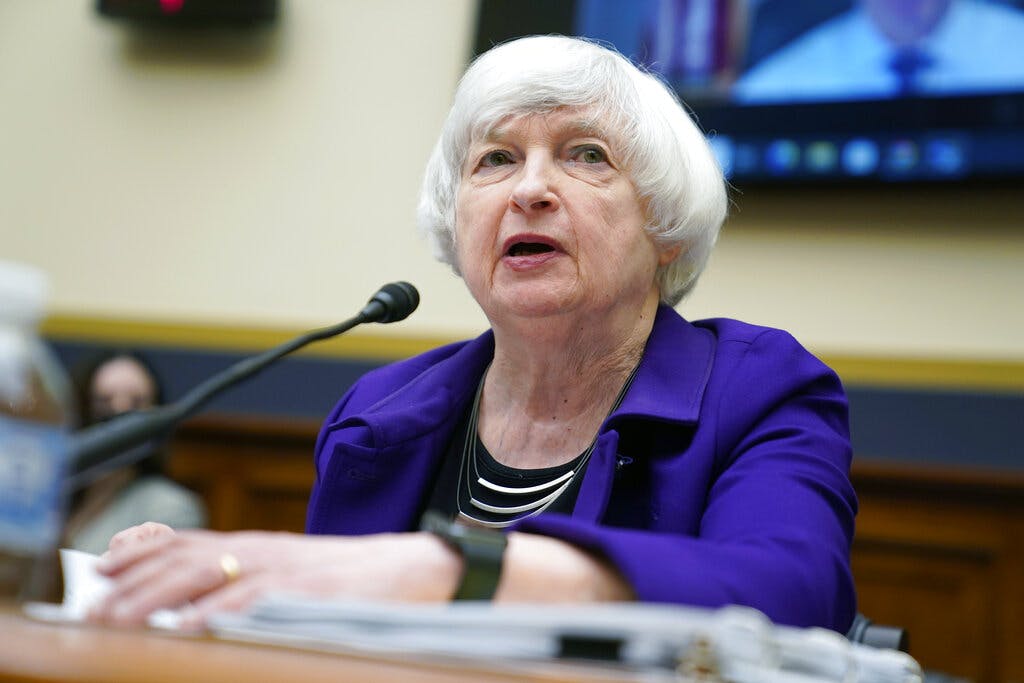Crypto Industry on Edge as Yellen Set To Outline Regulatory Reform
The Treasury policies have the potential to shape the nascent cryptocurrency industry — which now is worth more than $2 trillion — for decades to come.

Treasury Secretary Janet Yellen is expected to make her first substantive speech on the contentious topic of cryptocurrencies on Thursday, offering what is described as guidance on the principles that will steer her department’s approach to regulation of digital assets going forward.
The speech at American University “will make the case for a consistent and comprehensive policy framework that promotes responsible innovation of digital assets and appropriately assesses and mitigates the risks they may pose,” according to an advisory issued by the Treasury department.
Secretary Yellen’s speech comes almost a month to the day after President Biden issued a long-awaited executive order tasking federal agencies with developing a regulatory framework for digital assets such as Bitcoin and other cryptocurrencies. The order also “urgently” called for research and development on the creation of a central bank digital currency, or so-called digital dollar.
The policies Ms. Yellen begins to outline on Thursday have the potential to shape the nascent cryptocurrency industry — which now touches more than 40 million Americans and is worth more than $2 trillion — for decades to come. Industry insiders worry that any missteps by federal regulators could choke off further innovation in the area.
In testimony before the House Financial Services Committee on Wednesday, Ms. Yellen gave no hints as to the substance of her Thursday speech. She delved only tangentially into the topic of digital assets when asked about the potential use of cryptocurrencies by Russia to avoid sanctions imposed in response to its war with Ukraine.
Before becoming treasury secretary, Ms. Yellen served for nearly two decades in various positions on the Federal Reserve Board, including as its chairwoman during the Obama administration. During that time, she gained a reputation as something of a cryptocurrency skeptic, describing Bitcoin as a “highly speculative asset” in testimony before Congress.
In her post-Fed years, she was even more blunt, telling attendees at a Canadian financial technology forum in 2018 that she was “not a fan” of Bitcoin. At the same forum, she also expressed concern about the development of central bank digital currencies because of the potential for bad actors to misuse a digital dollar and the cybersecurity risks.
As treasury secretary, Ms. Yellen’s primary dust-up with crypto supporters was during debate over an infrastructure bill passed late in 2021. Tucked into the bill was a measure — lobbied for by Ms. Yellen — that tightened tax reporting requirements on the exchanges that hold many cryptocurrency assets.
More recently and since the publication of Mr. Biden’s executive order, however, Ms. Yellen has taken a more conciliatory tone on the topic. In an appearance on CNBC in late March, she said that while she still has concerns related to financial stability of cryptocurrencies, their use in illicit transactions, and protections for investors and consumers, she conceded some benefits to the technology and acknowledged its growing role in the current financial landscape.
“We recognize the innovation in the payment system can be a healthy thing,” Ms. Yellen said, adding that she is keen to help develop a regulatory framework that fosters innovation.
Mr. Biden’s executive order was widely welcomed by people in the cryptocurrency industry, most of whom cheered the chance for some legal clarity about who or what is going to manage the inevitable regulation that comes with wider public acceptance.
At the time, the Blockchain Association trade group said its 80 members were eager to collaborate with the administration to develop what it called “pragmatic and timely oversight” of the industry.
There are also those in the industry who want the Treasury Department and other regulators to go further than just deciding which agency will set the rules for which assets. Some have called for a wholesale rethinking of the financial system as part of the process.
During a panel discussion about the executive order sponsored by the Technology Policy Institute last week, the head of U.S. public policy for the Electric Coin Company, Paul Brigner, suggested that regulators return to “first principles” in their quest to understand the importance of cryptocurrencies.
“I think what this technology gives us is the ability to rethink the entire financial ecosystem,” Mr. Brigner said. “It gives us the ability to go back and think about whether the fiat system is right from the beginning.
“The fiat system has developed largely within my lifetime,” he added. “The whole development of central banks around the world — much of that has happened in the last 50 years. Maybe it didn’t have to be this way and maybe it shouldn’t be this way and maybe there’s a new technology that gives us powers that we never dreamed of and maybe we should rethink everything.”

